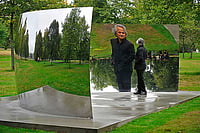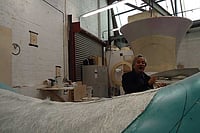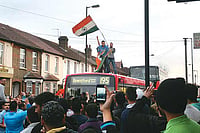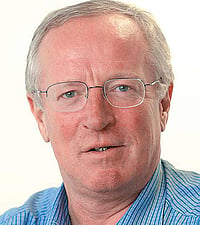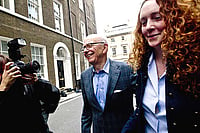Drink It Up With Your Single Malt
- a daeless boadie (a carefree person)
- a gruppit hault (I took a firm grip)
- a pluckit-up heart (I took courage)
- a pooerfu daien (an amazing event)
- a quare gunk (a big surprise)
- a sair pech (a hard labour)
- a wee han (help or assistance)
- aa med up (delighted, thrilled)
- aff han (without delay)
- aince an ay (once and for all)
- awa er thon (clear off)
alloo(tae) (be of the opinion that)
***
Break-ups are always difficult. When two countries have been together for so long they can barely remember what united them in the first place, it can be natural for one of them—a fiercely proud keeper of the memory of its ancient nation, its struggles and its culture—to want to wrench free.
In this case, it is Scotland who brushes Britain’s hand off its knee in those moments in front of the television that have gone from cosy to awkward. Sick of being yoked to Westminster despite a devolved parliament, and its economic and foreign policies that affect the standing of the United Kingdom and, crucially, each of its component parts globally, Scotland is doing some soul-searching over what it really wants as a nation.
Scotland is gearing up to decide in a referendum in September whether to break from the union with England, Wales and Northern Ireland. A campaign that has focused on economic and political influence has been fought on many other fronts too. For a group of nations with so many shared characteristics, it is still difficult to tell what a breakaway by the Caledonian cousins would mean.
Nasar Meer, a professor of social sciences at Strathclyde University, Glasgow, says: “If an independent Scotland honours some of what those who are arguing for it think it will, then you would have radical departure from the Thatherism that still dominates the political mainstream in Westminster. So, an energy rich, centre-left, socially and politically progressive country in the north of Europe with no nuclear weapons.”
For some Scots, the main issue is to break away from ‘auld enemy’ England, so dominant over its daily life for the past 300 years since the Act of Union in 1707. For others, it is reclaiming what’s rightfully theirs—North Sea oil revenues that end up elsewhere—and an end to a disproportionate tax input compared to spending (in Scotland) by Britain.
Alex Salmond, the Scottish first minister and Scottish National Party leader has been the figurehead for the ‘Yes’ campaign. He is calling on Scottish pride and trying to reignite Celtic warrior passions of old that have generally been reserved to sporting events like the Six Nations rugby tournament. Recently describing David Cameron and his London cohorts as “thieves who plunder Scotland’s black gold”, Salmond is ready to stoke whatever fires are necessary to get his way.
***
10 Famous Scottish Personalities From Different Fields

| David Hume Philosopher, practitioner of the essay as a literary genre |

| Adam Smith Founder of political economy and author of The Wealth of Nations | ||

| James Watt Inventor of the Watts steam engine |

| John Stuart Mill Philosopher, economist | ||

| Thomas Macaulay Historian, imperialist, author of Minute on Education, and IPC |

| Andrew Carnegie Steel magnate, donor, was world’s richest man | ||

| Alexander Graham Bell Scientist, engineer and inventor of the telephone |

| Arthur Conan Doyle Writer, creator of Sherlock Holmes | ||

| Sean Connery Actor, the original James Bond |

| Andy Murray Tennis player and Wimbeldon champion |
***
Echoing this clarion call, Aamer Anwar, a lawyer and long-term advocate for independence, says: “The nation will have freedom, an ability to decide its own destiny without interference. To determine its own policies on defence, health, and the economy. We will also no longer be associated with a warmongering nation or be taken for granted.”
In the ‘No’ camp, surprisingly, are senior figures in the Labour party—one of the groups most likely to gain seats and influence through an independent Scotland. In the 2010 polls, the swing from Gordon Brown’s Labour to David Cameron’s Conservatives across much of England stopped dead at its northern border. Led by former chancellor Alistair Darling and deputy Scottish Labour party leader Anas Sarwar, the ‘No’ campaign argues that collective prosperity and security are better for the nation. These arguments are backed up by the aggressive threat from down south that Scotland may not be able to hang on to the sterling, EU or NATO membership, could lose the BBC and may face unfavourable trade terms.
Like the rest of Britain, Scotland has a rich tradition of immigrants settling down, and it boasts robust Asian communities as part of its Tartan political fabric. So much so that there is a Scots Asians For Yes campaign. Anwar is a spokesman: “For far too long the UK governments have taken the Asian community for granted—ready to play the race card against us. As a Scottish Asian, I feel more accepted, less prone to suffer from racism than other British Asians. Being Scottish is an identity traversing colour, class, religion.”
Tasmina Ahmed Sheikh, lawyer, actor and another ‘Yes’ campaigner, echoes this point. “The Scottish Asian identity is very strong.... If you ask around they are very proud to be Scottish and very proud to be Asian. And our votes will make a big difference to the campaign.”
At a poll recently held by Awaz FM, the main Asian radio station in Scotland, 64 per cent listeners supported independence. “Scottish Asians have historically identified with and I suppose are pluralising what Scottish identity signifies,” says Meer. “But we’re a long way from having the kinds of mixed-up ideas of Britishness we saw at the London Olympics and elsewhere. The better question might be: is Scottishness more open to British Asians than Englishness? When you think of Scotland, does somebody like Mo Fara, Jessica Ennis or Monty Panesar come to mind? Not yet.”
Which raises the point of how an independent Scotland would deal with Commonwealth countries—especially India and Pakistan—with the old adage being that England may have created the Empire, but it took the Scots to run it.
But Shab Jaffri, another member of Scots Asians For Yes, says: “They were never Scotland’s colonies, but Scotland will continue to build on the excellent relations it has with India and Pakistan because of the great relationship...with Asian Scots who have it their home....”
However, Meer spots a cobra in the cupboard. “This concerns how over various cycles of imperial expansion and colonial settlement, Scotland developed an exploitative commercial relationship with India. In the words of the third Earl of Rosebery, this relationship ‘Scotticised India and Orientalised Scotland’. Thus, in the most profitable parts of the East India Trading Company, as the historian Tom Devine has shown, around half of the accountants and officer cadets were Scottish. From the mid-19th century, the British Raj was shaped under a Scottish governor (James Dalhousie), while the Scot Charles Napier annexed Sind.”
But for Sheikh and others, opinion abroad favours their cause. “I travel widely, especially in south Asia and the Middle East, and people abroad seem to say, ‘Why would you not vote ‘Yes’?’ For outsiders it seems a no-brainer.”
No-brainer or not, with even pop-star David Bowie getting involved—in typically eccentric fashion he sent supermodel Kate Moss to pick up a music award and read a rambling statement, ending incongrously, ‘Scotland, stay with us’—it is tough to separate the political from the personal in this contentious issue. Britain has donned its best threads and splashed out on some orchids, but is Scotland’s heart already elsewhere?
By Saptarshi Ray in London













